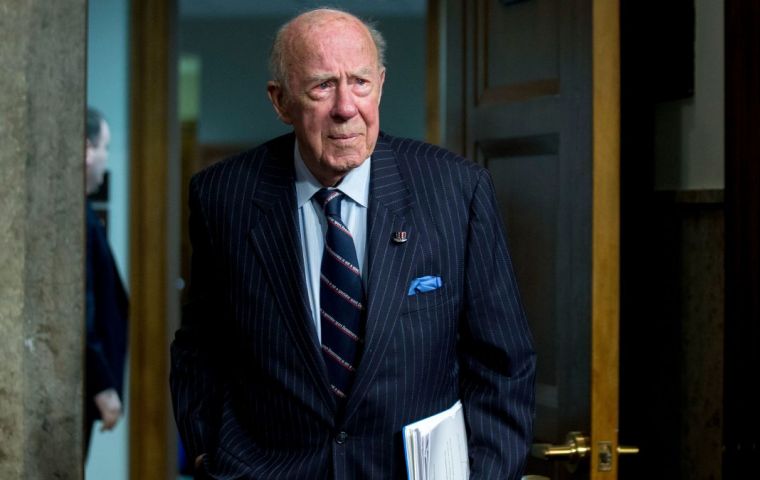MercoPress. South Atlantic News Agency
Reagan's secretary of State, George Shultz dies at age of 100. He served in four different cabinet positions
 In the Reagan White House, notorious for infighting, Shultz was one of the least controversial figures, cultivating cordial ties with Congress and the press
In the Reagan White House, notorious for infighting, Shultz was one of the least controversial figures, cultivating cordial ties with Congress and the press President Ronald Reagan's Secretary of State, George Shultz, a resourceful strategist who helped dismantle the Cold War has died at the age of 100. An economics professor who saw himself more as a data-driven expert than an ideologue, Shultz had the rare distinction of serving in four different cabinet positions - including Treasury secretary with Richard Nixon.
“One of the most consequential policymakers of all time, having served three American presidents, George P. Shultz died Feb 6 at age 100,” the Hoover Institution think tank said in a statement on its website.
In the Reagan White House, notorious for infighting, Shultz was one of the least controversial figures, cultivating cordial ties with Congress and the press and, most crucially, rock-solid backing from the president himself, who kept Shultz as his top diplomat for six and a half years.
In early 1983, half a year into his tenure, Shultz returned from China to a snowed-under Washington and was invited by Nancy Reagan to a casual dinner at the White House where he was intrigued to hear the famously anti-Communist president sound eager to meet the Soviets.
“He had never had a lengthy session with an important leader from a Communist country, and I could sense he would relish such an opportunity,” Shultz wrote in his memoir, “Turmoil and Triumph.”
Days afterward, Shultz brought the Soviet ambassador to the White House in an unmarked car for a secret meeting with Reagan, who pressed for Moscow to allow the emigration of Pentecostal Christians who had sought refuge in the US embassy.
The Soviets quietly followed through. Reagan's unlikely role as a negotiator with the superpower he termed an “evil empire” had begun.
In 1985, Mikhail Gorbachev ascended to the helm of the Communist Party and Shultz, joining then vice president George H.W. Bush, flew to Moscow and met him at the funeral of his predecessor, Konstantin Chernenko.
Shultz immediately detected opportunities with Gorbachev. “Gorbachev is totally different from any Soviet leader I've met,” Shultz told reporters.
A former Marine who fought the Japanese in World War II, he recalled the trust he built with the Soviets as Treasury secretary when he offered a sincere salute at a memorial to their war dead.
Shultz's approach with Gorbachev encountered deep skepticism from Defense Secretary Caspar Weinberger and CIA chief Bill Casey, but Reagan overruled them.
By 1987, Reagan and Gorbachev signed the landmark Intermediate-Range Nuclear Forces Treaty. The Soviet Union soon began disintegrating after Gorbachev initiated liberal reforms and dissent grew.
Shultz later played down the role of Gorbachev, pointing to underlying weaknesses in the Soviet system and crediting the US leader's massive boost in defense spending. He also hailed European allies, especially West Germany, that defied public protests against Nato missile deployments in the 1980s.
“The Soviets had to see that and realize that we were strong and our diplomacy was based on strength,” Shultz said in a 2015 appearance at Stanford University's Hoover Institution, where he spent his post-government career.
Shultz became secretary of state weeks after Israel invaded Lebanon, a nation that would become central to an issue that would define his tenure - terrorism.
In 1983, a suicide bomber suspected to be a Shiite Muslim militant blew up the barracks of US Marines serving as peacekeepers in Lebanon, killing 241, with a second attack targeting French forces, killing 59.
With hijackings and bombings rising around the world, Shultz vowed in a 1984 speech at a New York synagogue that the United States would go “beyond passive defense to consider means of active prevention, preemption and retaliation.” “We cannot allow ourselves to become the Hamlet of nations, worrying endlessly over whether and how to respond,” said Shultz, who recommended the US strikes on Libya in 1986 after a US soldier died in an attack on a Berlin nightclub.
Shultz's doctrine was cited two decades later when George W. Bush invaded Iraq, inaccurately alleging it was pursuing weapons of mass destruction. Shultz vocally backed the invasion, which along with ensuing wars would claim hundreds of thousands of lives.
Shultz had served Nixon as labor secretary and also headed his Office of Management and Budget, a cabinet-level post.
In an essay for his 100th birthday in 2020, he bemoan the style of Donald Trump, saying that the United States, like individuals, could succeed only if others trust it. “Put simply,” he said, “trust is the coin of the realm.”




Top Comments
Disclaimer & comment rulesCommenting for this story is now closed.
If you have a Facebook account, become a fan and comment on our Facebook Page!